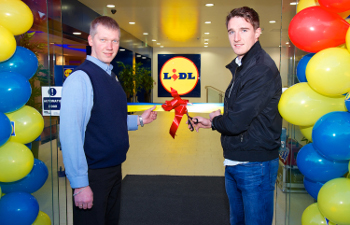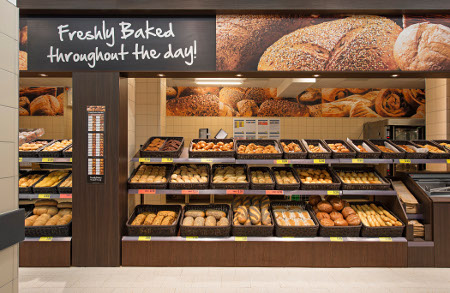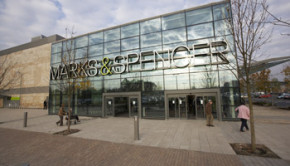A Lidl look at Cork

Lidl has opened its 140th store in the country so ShelfLife decided we were well overdue an official visit to one of its stores. Fionnuala Carolan travelled to Cork to meet with the sales operations manager of the newly opened Cornmarket Centre store, Seamus Hogan and the head of communications with Lidl, Aoife Clarke, and learned a lot about this previously media-shy brand
12 June 2014
PROFILE
Lidl, The Cornmarket Centre,
Cork city centre
District manager: Seamus Hogan
Store manager: Derek Orsebski
Size: 10, 670 sq ft
Staff: 29 full-time
Opening hours: Mon-Sat 8am to 9pm/Sunday 10am to 7pm
The Cornmarket Centre in Cork is the location of the city’s first Lidl. In the basement of this former brewery is a bustling store which Seamus Hogan says has been trading exceptionally well since day one. As sales operations manager (SOM) over this store and five others, Hogan has been at the helm of many store openings and says he really enjoys the process.
"You generally get a lead in time of 10 to 14 days when the store is handed over from our property department," he explains. "I get a phenomenal buzz from opening stores. You are faced with a shell. There is nothing there, not a shelf or an upright or a piece of stock. You have a schedule to achieve every day. We don’t use store fitters, we do everything ourselves.
"Here was a bit harder [than other store openings] because it was a bespoke site but on a standard store opening, it would be very straightforward. I’ve done maybe ten openings at this stage so you could do it with your eyes closed but this was different."
This is Hogan’s fourteenth year with the company, and throughout that time he has seen a massive change in how Lidl is perceived by the public but also how the company interacts with its customers. He explains: "While in the first few years people were very wary of you moving into a town because they were afraid of the loss of custom, now I think people realise that we compliment other retailers. You’d be very surprised with the reaction we’d get from certain places. I got a phone call from the manager of the local Centra and I went to meet him and it wasn’t a case of ‘you’re going to destroy me here’ but more ‘how can we help each other’. We’ve had no problems. A big store and a small store can compliment each other."
Hogan is a prime example of how hard graft can pay off handsomely when you work for a progressive company such as this. He joined the German retailer in 2000 when it was in its infancy here. His first position was as a store assistant in Youghal, the eighth store in the country at the time. He got promoted quickly to supervisor in that store and three months later to deputy store manager. Six months after that he was moved to Mallow to become the store manager. "We were growing phenomenally quickly then so I moved around a bit, and went through a lot of stores, opening them up in Cork, Waterford, Clonmel and Togher. I was store manager in Togher for three years. Then I opened the Dungarvan store and I was there only about three months when I got a call asking would I come up for a chat to Charleville. I got promoted to district manager in March 2008 and ran that district for three years. Just last year I got moved into Cork and I absolutely love it here now."

The well-stocked bakery sits on the back wall and is a hugely important part of the store
Cornmarket opening
The Cornmarket store is a typical Lidl store in that it is clean, spacious and well stocked. What stands out is the fantastic bakery section across the back wall. As Hogan explains, all Lidl stores are the exact same in size and layout but the dimensions of this store are slightly different so they had to do some tweaking. This meant that the bakery which is usually positioned on the left hand wall when you enter a store was placed on the back wall. The other major difference I noticed was the wine display. The bottles are merchandised in dark wooden cases, a stark difference to the usual cardboard cartons we are accustomed to seeing in Lidl stores. These little touches are markers to denote how Lidl is changing its ‘pile it high and sell it cheap’ philosophy to actually creating a pleasant shopping environment, where people would be more disposed to browsing than doing a trolley dash.
Promotions
Lidl earned its stripes as a discount supermarket so promotions wouldn’t feature as prominently as they would in another supermarket, as the products are presumed to be as low as they can go already. Despite this there is some promotional activity with the branded range of products that they hold. Hogan explains: "Our In/Out section is our branded section of the store. There are 12 products on promotion every two weeks. We run our own promotions then during the week with an assortment of products. Like this week we have three meat products on offer. There would be specific products which would change every week and they would be heavily advertised on our leaflets also. They might be moved out of their normal location just to highlight them to customers."
What makes the likes of Lidl stand out from a regular supermarket is their eclectic mix of non-food items. I wondered what was the most unusual non-food product they have sold to date. "Probably the generators and the sleighs for Christmas for the snow," says Clarke. "The buying team go over to Germany around four times a year to pick the non-food products. There is a huge warehouse and all the goods are pre-selected for the 26 countries and then each country’s buyer goes around and decides what they want. Then they would source things themselves like the GAA ranges as obviously that is an Irish thing."
Change of ethos
There has been a considerable shift in the way Lidl relates to the public in recent times. Clarke describes this change in direction as a natural evolution as the company has become more comfortable in the Irish market. "At the start when the perception of Lidl was much different we were reluctant to go out there but as people get more and more used to shopping with us and trusting us as a retailer, now we know that our messages are going to be taken in the manner that we would want them to be. We had always bought our fresh meat in Ireland, we just never marketed it properly or talked about it but in the last few years we would be more comfortable saying where our food comes from and it’s a natural relationship with suppliers as they are happy to promote their products too so it’s a win for everyone."
She says that about 45% of their range would be sourced in Ireland now. "When we first started in Ireland in 2000 there was a completely different range of products because when you just arrive into a country you don’t have those relationships with suppliers so you have to build them up. We didn’t even have a warehouse in Ireland. It’s only natural that as the years have moved on, we have developed relationships.
Moving into the US
While Lidl is operating in 26 European countries the company is starting to look at the US for future growth. Members of the Lidl team are currently in the US doing a feasibility study on that market. "I think it’s pretty much decided that we’ll go [into the US] but it’ll be 2018 before it happens. It’s a different market so you have to see if the same store concepts work, and if people are looking for the same sort of products. They have Walmart so they are used to the discount philosophy over there to a certain extent so it will be interesting to see how that goes. The US is in the long term expansion plans. Before that there are a number of Eastern European countries to be captured."
Clarke explains that Christine Rittner, former regional director in Ireland has just been announced as the MD of Lidl’s newest market, Lithuania. They haven’t opened there yet but the stores are under construction.
Discounter label is null and void
While Lidl and Aldi have long been grouped together under the collective heading of ‘the discounters’, Clarke believes that this label is outdated. "I know years ago there would have been a big divide. There were Lidl and Aldi and then on the other side there were Tesco, Dunnes and SuperValu, whereas now I think we are all talked about in the same breath. There are five supermarkets in the Irish market. We would call ourselves a supermarket that has a discount philosophy. We haven’t lost it but everyone else has jumped on the bandwagon.
"We would have been known for price originally but we would have made a huge effort in recent years to work on the quality so we are saying to people, just because it is cheap, it doesn’t mean it’s bad. We would have done a lot of brand challenges where we would have tested products independently against the brand leader. Our own brand cornflakes would have beaten Kellogg’s, our own brand tea would have beaten Lyon’s.
"I think a lot of people don’t understand buying power. Over in Germany there are guys negotiating deals with the buying power of 26 countries behind them so that’s why it’s so cheap and that’s why we don’t have three different types of cornflakes. We just buy what we think is equal or better than the leading brands and buy it in massive bulk to get the best price."
Lidl now accounts for 7.9% of the Irish market, according to the latest Kantar Worldpanel figures. It’s not a bad return for a company that arrived here 15 years ago as a completely foreign brand and introduced a whole new shopping concept to the Irish people.
Lidl Ireland consists of four regions, Charleville, Newbridge, Mullingar and Nutts Corner (Northern Ireland) and each region has a warehouse and is responsible for supplying all the stores in this region. There would normally be between 40/50 stores per region and each sales operations manager would be responsible for around 4/5 stores each.



 Print
Print






Fans 0
Followers